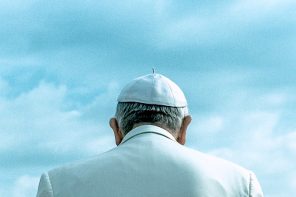The U.S. Catholic bishops have now gathered four times for their semi-annual meeting since Pope Francis was elected in March of 2014: twice for the fall plenary and twice for their spring meeting. It’s understandable that their earliest meetings during his pontificate didn’t necessarily reflect his imprint. It takes time for a pope to make his priorities known and to issue the formal encyclicals and other documents that leave the permanent mark of his papacy on the church.
One could argue, therefore, that the lack of alignment between the priorities of the U.S. Conference of Catholic Bishops and Francis wasn’t a willful rejection of the pope’s agenda, but more of a wait-and-see attitude of exactly what that agenda was and how it could be implemented in concrete detail.
But the jig is up. Its been nearly three years. The pope has clearly laid out his priorities, first in Laudato si and then during his recent trip to the U.S. But at their fall meeting in Baltimore this week, the majority of the bishops forcefully rejected giving Francis’ concerns regarding poverty, the environment and immigration equal time with their own regarding abortion and same-sex marriage.
First, the bishops voted for a list of priorities that looks exactly like their list from every other recent meeting: evangelization (“a personal encounter and relationship with Jesus”), family and marriage (promotion of the “traditional” family), human life and dignity (opposition to abortion and euthanasia), vocations and ongoing formation (shoring up the rapidly declining number of priests and nuns) and, of course, religious freedom (Archbishop Carlo Maria Vigano, who arranged Kim Davis’ meeting with Pope Francis, received two standing ovations from the bishops.).
Then the debate turned to the USCCB’s quadrennial “Faithful Citizenship” voting guide. The bishops had voted earlier to revise the 2007 edition prepared for the 2008 election, which was the last time the guide was completely overhauled, rather than draft a new guide for 2016. The 2007 guide was created after the previous version was widely interpreted as saying that Catholics had to elevate opposition to abortion as their main criteria for evaluating candidates, which was used to pillory John Kerry in the 2004 election.
The 2007 edition, however, retained opposition to abortion and euthanasia as “foundational” issues for Catholics in voting. Several bishops perceived to be allied with Pope Francis complained this week that such a framework failed to reflect the pope’s broader array of social justice concerns. As Michael O’Loughlin reports at Crux, San Diego Bishop Robert McElroy, who was recently elevated by Francis, called the document “gravely hollow.”
McElroy said, “In the specific key areas where it lays out how does the voter make a decision, it tilts in favor of abortion and euthanasia and excludes poverty and the environment.”
The most aggressive revisions the bishops did make to “Faithful Citizenship” were to beef up references to their opposition to same-sex marriage, which now total nine, changes that National Catholic Reporter blogger Michael Sean Winters notes “clearly are designed to make it lean more to the right and to the GOP.”
The final straw was the leadership elections. Four candidates for key posts within the conference were “Francis” candidates—bishops he has elevated since 2014. Despite this, Youngstown, OH, Bishop George Murry, won for the not terribly consequential post of chair of the Committee on Catholic Education. Philadelphia Archbishop Charles Chaput beat another Francis pick, Bridgeport, CT, Bishop Frank Caggiano, for chair of the Committee on Laity, Marriage, Family Life and Youth, which is responsible for promoting the church’s teaching regarding hot-button issues like family and contraception (or the lack thereof).
Msgr. J. Brian Bransfield was elected as the conference’s new general secretary. NCR’s Winters, who has been an outspoken critic of the increasingly culture-warrior posture of the USCCB staff, called Bransfield’s election “a first-class disaster” for the conference. As Winter noted, “The sad and regrettable fact is that the USCCB of late has acquired only the smell of the neo-conservative, upper middle class Catholic sheep and the Republicans for whom they vote.”
It appears the sheep have spoken and Francis lost.




